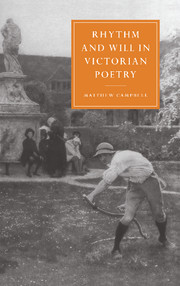Book contents
- Frontmatter
- Contents
- Preface and acknowledgements
- Texts used
- Chapter 1 Introduction: two decisions
- Part One RHYTHMS OF WILL
- Part Two MONOLOGUE AND MONODRAMA
- Part Three MAKING A WILL
- Chapter 6 The drift of In Memoriam
- Chapter 7 Incarnating elegy in The Wreck of the Deutschland
- Chapter 8 The mere continuator: Thomas Hardy and the end of elegy
- Notes
- Bibliography
- Index
- CAMBRIDGE STUDIES IN NINETEENTH-CENTURY LITERATURE AND CULTURE
Chapter 6 - The drift of In Memoriam
Published online by Cambridge University Press: 22 September 2009
- Frontmatter
- Contents
- Preface and acknowledgements
- Texts used
- Chapter 1 Introduction: two decisions
- Part One RHYTHMS OF WILL
- Part Two MONOLOGUE AND MONODRAMA
- Part Three MAKING A WILL
- Chapter 6 The drift of In Memoriam
- Chapter 7 Incarnating elegy in The Wreck of the Deutschland
- Chapter 8 The mere continuator: Thomas Hardy and the end of elegy
- Notes
- Bibliography
- Index
- CAMBRIDGE STUDIES IN NINETEENTH-CENTURY LITERATURE AND CULTURE
Summary
Christopher Ricks suggests that Tennyson's early sonnet, ‘Conrad! why call thy life monotonous?’, probably borrows the character to whom it gives its advice from Byron's The Corsair, where, ‘On Conrad's stricken soul Exhaustion prest, / And Stupor almost lulled it into rest’ (III, xxii). The sonnet was never published in Tennyson's lifetime, and the manuscript appears in Heath Notebook 7, along with poems published in 1830 and 1832. Writing about Tennyson and nineteenth-century subjectivism, William Brashear suggests that it counters another poem of the period, ‘The Lotos-Eaters’, in which Odysseus' exhausted mariners seem ‘to give way completely to absorption’. Indeed, ‘Conrad!’ also plays with many of the images of water, calm and sloth which will later tempt the speaker of In Memoriam A.H.H.
Conrad! why call thy life monotonous?
Why brood above thine anchor? The woven weed
Calms not, but blackens, the slope water bed.
The shores of life are fair and various,
But thou dost ever by one beach abide.
Why hast thou drawn thine oars across the boat?
Thou canst not without impulse downward float,
The wave of life hath no propelling tide.
We live but by resistance, and the best
Of life is but the struggle of the will:
Thine unresisting boat shall pause – not still
But beaten on both sides with swaying Unrest.
Oh! cleave this calm to living eddies, breast
This sloth–sprung weed with progress sensible.
- Type
- Chapter
- Information
- Rhythm and Will in Victorian Poetry , pp. 157 - 186Publisher: Cambridge University PressPrint publication year: 1999



